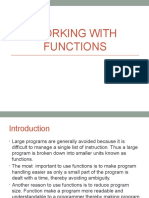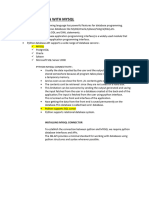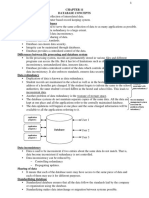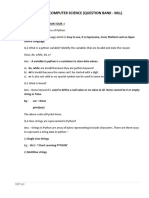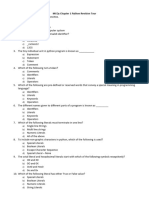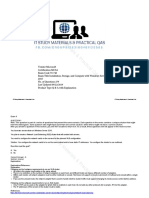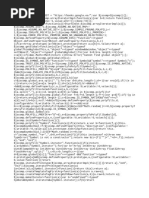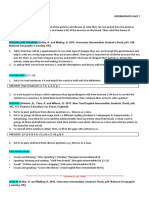Computer Science Revision Notes CBSE Class 12
Uploaded by
adityaComputer Science Revision Notes CBSE Class 12
Uploaded by
adityaComputer Science Revision Notes CBSE class 12
We think the first step is motivating yourself to revise. What are you trying to achieve
here? What’s your ultimate goal? Make a schedule for your revision and be realistic
about it. Figure out how much time you can spend on a task each day. The important
part of exam preparation and the key to success, as the more you revise these notes.
These revision notes are prepared by our finest and experienced teachers. You can
download class 12 Computer Science Revision Notes in PDF format. These Revision
Notes are also available in the myCBSEguide webs
ite and mobile app for free.
Programming and Computational Thinking
Download CBSE Revision Notes for CBSE Class 12 Computer Science Programming
and Computational Thinking Revision of the basics of Python Functions: scope,
parameter passing, mutable/immutable properties of data objects, pass arrays to
functions, return values, functions using libraries: mathematical, and string functions.
File handling: open and close a file, read, write, and append to a file, standard input,
output, and error streams, relative and absolute paths. Using Python libraries: create
and import Python libraries Recursion: simple algorithms with recursion: factorial,
Fibonacci numbers; recursion on arrays: binary search Idea of efficiency: performance
defined as inversely proportional to the wall clock time, count the number of operations
a piece of code is performing, and measure the time taken by a program. Example: take
two different programs for the same problem, and understand how the efficient one
takes less time. Data visualization using Pyplot: line chart, pie chart, and bar chart.
Data-structures: lists, stacks, queues.
Go To Downloads
Object Oriented Programming in CPP (OLD)
Download CBSE Revision Notes for CBSE Class 12 Computer Science Object Oriented
Programming in CPP (OLD) Object Oriented Programming: Concept of Object Oriented
Programming – Data hiding, Data encapsulation, Implementation of Object Oriented
Programming concepts in C++: Definition of a class, Member of a class Constructor and
Destructor Special Characteristics, declaration and definition of destructor Inheritance
(Extending Classes Data File Handling: Need for a data file, Types of data files – Text
file and Binary file basic file operations on text file Binary File Components of C++ to be
used with file handling Header file: fstream.h; ifstream, ofstream, classes Introduction to
Pointer, Declaration and Initialization of Pointer self referencial structure etc
DBMS and SQL (OLD)
Download CBSE Revision Notes for CBSE Class 12 Computer Science DBMS and SQL
(OLD) Data base Concepts: Introduction to data base concepts and its need. Relational
data model: Concept of domain, tuple, relation, key, primary key, alternate key, General
Concepts: Advantages of using SQL, Data Definition Language and Data Manipulation
Language SQL functions: SUM ( ), AVG ( ), COUNT ( ), MAX ( ) AND MIN ( ); Obtaining
results (SELECT query) from 2 tables using equi-join, Cartesian product and Union
Note: Implementation of the above mentioned commands could be done on any SQL
supported software on one or two tables.
Go To Downloads
Boolean Algebra (OLD)
Download CBSE Revision Notes for CBSE Class 12 Computer Science Boolean
Algebra (OLD) Role of Logical Operations in Computing. Binary-valued Quantities,
Boolean Variable, Boolean Constant and Boolean Operators: AND, OR, NOT; Truth
Tables; Closure Property, Commutative Law, Associative Law, Identity law, Inverse
Law, Principle of Duality, Idempotent Law, Distributive Law, Absorption Law, Involution
Law, DeMorgan's Law and their applications; Obtaining Sum of Product (SOP) and
Product of Sum (POS) form the Truth Table, Reducing Boolean Expression (SOP and
POS) to its minimal form, Use of Karnaugh Map for minimization of Boolean
expressions (up to 4 variables); Application of Boolean Logic: Digital electronic circuit
design using basic Logic Gates (NOT, AND, OR, NAND, NOR) Use of Boolean
operators (NOT, AND, OR) in SQL SELECT statements Use of Boolean operators
(AND, OR) in search engine queries.
Go To Downloads
Communication Technologies (OLD)
Download CBSE Revision Notes for CBSE Class 12 Computer Science Communication
Technologies (OLD) Evolution of Networking: ARPANET, Internet, Interspace Data
Communication terminologies Transmission mediaNetwork devices Network Topologies
and types Network ProtocolMobile Telecommunication Technologies Protocols for Chat
and Video Conferencing VOIP Network Security Concepts India IT Act, Cyber Law,
Cyber Crimes, IPR issues, hacking.Introduction To Web services Domain Names E-
commerce payment transactions using online banking, mobile banking and payment
apps and services.
Go To Downloads
myCBSEguide App
Join India's most trusted study app used by 70 Lakhs students and teachers to study
on the go. Learn and practice with myCBSEguide Sample Papers, Test Papers,
Revision Notes, Previous year question papers, NCERT solutions, Online MCQ tests,
Homework Help and much more from class 3 to 12 (all subjects)
Install App Now
CBSE Class12 Notes and Key Points
CBSE Revision notes (PDF Download) Free
CBSE Revision notes for Class 12 Computer Science PDF
CBSE Revision notes Class 12 Computer Science – CBSE
CBSE Revisions notes and Key Points Class 12 Computer Science
Summary of the NCERT books all chapters in Computer Science class 12
Short notes for CBSE class 12th Computer Science
Key notes and chapter summary of Computer Science class 12
Quick revision notes for CBSE board exam
CBSE Class 12 Computer Science Chapter-wise Revision
Notes
Chapter 1 – Review of Python
Chapter 2 – Concept of Object Oriented Programming
Chapter 3 – Classes in Python
Chapter 4 – Inheritance
Chapter 5 – Linear List Manipulation
Chapter 6 – Stacks & Queues in list
Chapter 7 – Data File Handling
Chapter 8 – Exception Handling & Green Functions
Chapter 9 – Databases Concepts and SQL
Chapter 10 – Structure Query Language
Chapter 11 – Boolean Algebra
Chapter 12 – Boolean Functions & Reduce Forms
Chapter 13 – Application of Boolean Logic
Chapter 14– Networking Concepts (Part 1)
Chapter 15 – Networking Concepts (Part 2)
Chapter 16 – Networking Protocols
Chapter 17 – Mobile Telecommunication Technologies, Network Security and Internet
Services
Free Download of CBSE Class 12 Revision Notes
Key Notes for CBSE Board Students for Class 12. Important topics of all subjects are
given in these CBSE notes. These notes will provide you overview of the chapter and
important points to remember. These are very useful summary notes with neatly
explained examples for best revision of the book.
CBSE Class-12 Revision Notes and Key Points
CBSE quick revision note for class-12 Computer Science, Chemistry, Maths, Biology
and other subject are very helpful to revise the whole syllabus during exam days. The
revision notes covers all important formulas and concepts given in the chapter. Even if
you wish to have an overview of a chapter, quick revision notes are here to do if for you.
These notes will certainly save your time during stressful exam days.
Revision Notes for class-12 Physics
Revision Notes for class-12 Chemistry
Revision Notes for class-12 Mathematics
Revision Notes for class-12 Biology
Revision Notes for class-12 Accountancy
Revision Notes for class-12 Economics
Revision Notes for class-12 Business Studies
Revision Notes for class-12 Computer Science
Revision Notes for class-12 Informatics Practices
Revision Notes for class-12 English Core
Revision Notes for class-12 History
Revision Notes for class-12 Physical Education
CBSE Class 12 Computer Science 1
Python Advanced Programming
Revision Notes (Review of Python)
Interactive Mode: Interactive Mode, as the name suggests, allows us to interact with
OS.
Script Mode: In script mode, we type Python program in a file and then use interpreter
to execute the content of the file.
Number: Number data type stores Numerical Values.
Sequence: A sequence is an ordered collection of items, indexed by positive integers.
Arithmetic operators: +, -, *, /, %, ** and //.
Relational operators: <, <=, >, >=, != or <> and ==.
Logical operators: or, and, and not
Assignment Operator: =, +=, -=, *=, /=, %=, **= and //=
Functions in Python: A function is named sequence of statement(s) that performs a
computation.
Module: A module is a file containing Python definitions (i.e. functions) and statements.
Standard library
of Python is extended as module(s) to a Programmer.
String: In python, consecutive sequence of characters is known as a string. An
individual character in a string is accessed using a subscript (index).
List: Like a string, list is a sequence of values. List can be of any type.
Dictionaries: A dictionary is like a list, but more in general. In a list, index value is an
integer, while in a dictionary index value can be any other data type and are called keys.
Tuples: A tuple is a sequence of values, which can be of any type and they are indexed
by integer.
(Concept of Object Oriented Programming)
Object: clearly defines an entity in terms of its properties and behaviour.
Class: a blueprint of an object.
Encapsulation: combining of data and the functions associated with that data in a
single unit
Data Hiding: the mechanism of hiding the data of a class from the outside world
Abstraction: providing only essential information to the outside world and hiding their
background details
Inheritance: forming a new class (derived class) from an existing class (called the base
class).
Polymorphism: ability to use an operator or function in various forms.
Static Binding: the linking of function call to the function definition is done during
compilation of the program.
Dynamic Binding: the linking of function call to the function definition is done during
the execution of the program.
(Classes in Python)
Namespace: A mapping from names to objects. Examples of namespaces are built-in
names, global names in a module and local names in function invocation
Scope: A region of Python program where a namespace is directly accessible.
In Python a name, storing any type of data, can refer to only one thing at a time.
The scope of a variable is its enclosing function, class or file.
The names always belong to the namespace where they are bound.
Names declared with global keyword have to be referred at the file level.
LEGB rule: when a name is encountered during the execution of the program, it
searches for that name in the following order:
L. Local - It first makes a local search i.e. in current def statement.
E. Enclosing functions - It searches in all enclosing functions, form inner to outer.
G. Global (module) - It searches for global modules or for names declared global
B. Built-in (Python) - Finally it checks for any built in functions in Python.
Class definitions should be given before it is referenced.
You might also like
- Set of 15 Sample Papers With Solutions & Blueprint For Class 12 Computer Science, 2024-25 Exam EditionNo ratings yetSet of 15 Sample Papers With Solutions & Blueprint For Class 12 Computer Science, 2024-25 Exam Edition163 pages
- Arihant Computer Science Class 12 Term 1 Sample PapersNo ratings yetArihant Computer Science Class 12 Term 1 Sample Papers171 pages
- CBSE Class 12 Computer Science - Communication and Network Concepts PDF67% (3)CBSE Class 12 Computer Science - Communication and Network Concepts PDF16 pages
- Basic ICT Skills Class 12 Notes - CBSE Skill EducationNo ratings yetBasic ICT Skills Class 12 Notes - CBSE Skill Education14 pages
- Important Questions For Class 12 Computer Science (Python) - Review of Python100% (1)Important Questions For Class 12 Computer Science (Python) - Review of Python31 pages
- CBSE Class 12 Computer Science - Communication and Network ConceptsNo ratings yetCBSE Class 12 Computer Science - Communication and Network Concepts16 pages
- CBSE Class 12 Computer Science Compartment Answer KeyNo ratings yetCBSE Class 12 Computer Science Compartment Answer Key24 pages
- Chapter 11 Database Concepts Class 12 CbseNo ratings yetChapter 11 Database Concepts Class 12 Cbse9 pages
- 12 TH Computer Science Python Unit-1 NotesNo ratings yet12 TH Computer Science Python Unit-1 Notes75 pages
- Class Xii Computer Science (Question Bank - MLL)No ratings yetClass Xii Computer Science (Question Bank - MLL)40 pages
- Pyqs of Data Structure - Stack For More Such Type of Questions and Detailed Video Explanation, Visit The Link100% (1)Pyqs of Data Structure - Stack For More Such Type of Questions and Detailed Video Explanation, Visit The Link6 pages
- Python Viva Questions For Class 12 Important For Practical Exam100% (1)Python Viva Questions For Class 12 Important For Practical Exam7 pages
- Class 12 PYTHON Ch-14 Grouping Records, Joins in SQL (Sumita Arora Latest Edition)No ratings yetClass 12 PYTHON Ch-14 Grouping Records, Joins in SQL (Sumita Arora Latest Edition)9 pages
- Introduction To Exception Handling in Python Class 12 Computer Science100% (2)Introduction To Exception Handling in Python Class 12 Computer Science16 pages
- Chapter-13-Table Creation and Data Manipulation Commands - NOTESNo ratings yetChapter-13-Table Creation and Data Manipulation Commands - NOTES8 pages
- Data Communication Notes Class 12 CS by Nitin Paliwal100% (2)Data Communication Notes Class 12 CS by Nitin Paliwal7 pages
- Database Concepts Class 12 Computer Science100% (1)Database Concepts Class 12 Computer Science13 pages
- Information Technology CLASS-12 Work Integrated Learning IT-DMA100% (2)Information Technology CLASS-12 Work Integrated Learning IT-DMA4 pages
- Blueprint of Computer Science Class XIINo ratings yetBlueprint of Computer Science Class XII21 pages
- 12 TH Clever Computer Science Project Marriage Bureau SystemNo ratings yet12 TH Clever Computer Science Project Marriage Bureau System26 pages
- Working With Functions Xii Output Questions50% (2)Working With Functions Xii Output Questions7 pages
- PDF Levi Strauss Anthropology and Aesthetics 1st Edition Boris Wiseman download100% (10)PDF Levi Strauss Anthropology and Aesthetics 1st Edition Boris Wiseman download71 pages
- Class Schedule in Esp: Regular Time Slot Time Slot in The New Normal SituationNo ratings yetClass Schedule in Esp: Regular Time Slot Time Slot in The New Normal Situation5 pages
- IBM - Generative AI - Prompt Engineering Basics- Course NotesNo ratings yetIBM - Generative AI - Prompt Engineering Basics- Course Notes35 pages
- How To Convert Zip To PDF Files or Combine Into One PDF?: AssistmyteamNo ratings yetHow To Convert Zip To PDF Files or Combine Into One PDF?: Assistmyteam8 pages
- How To Win Friends and Influence People SummaryNo ratings yetHow To Win Friends and Influence People Summary4 pages
- Accelerate 2E Unit 7 INT - Consumerism - Teacher - S Notes - Edited 17.02.20No ratings yetAccelerate 2E Unit 7 INT - Consumerism - Teacher - S Notes - Edited 17.02.2010 pages
- Set of 15 Sample Papers With Solutions & Blueprint For Class 12 Computer Science, 2024-25 Exam EditionSet of 15 Sample Papers With Solutions & Blueprint For Class 12 Computer Science, 2024-25 Exam Edition
- Arihant Computer Science Class 12 Term 1 Sample PapersArihant Computer Science Class 12 Term 1 Sample Papers
- CBSE Class 12 Computer Science - Communication and Network Concepts PDFCBSE Class 12 Computer Science - Communication and Network Concepts PDF
- Basic ICT Skills Class 12 Notes - CBSE Skill EducationBasic ICT Skills Class 12 Notes - CBSE Skill Education
- Important Questions For Class 12 Computer Science (Python) - Review of PythonImportant Questions For Class 12 Computer Science (Python) - Review of Python
- CBSE Class 12 Computer Science - Communication and Network ConceptsCBSE Class 12 Computer Science - Communication and Network Concepts
- CBSE Class 12 Computer Science Compartment Answer KeyCBSE Class 12 Computer Science Compartment Answer Key
- Pyqs of Data Structure - Stack For More Such Type of Questions and Detailed Video Explanation, Visit The LinkPyqs of Data Structure - Stack For More Such Type of Questions and Detailed Video Explanation, Visit The Link
- Python Viva Questions For Class 12 Important For Practical ExamPython Viva Questions For Class 12 Important For Practical Exam
- Class 12 PYTHON Ch-14 Grouping Records, Joins in SQL (Sumita Arora Latest Edition)Class 12 PYTHON Ch-14 Grouping Records, Joins in SQL (Sumita Arora Latest Edition)
- Introduction To Exception Handling in Python Class 12 Computer ScienceIntroduction To Exception Handling in Python Class 12 Computer Science
- Chapter-13-Table Creation and Data Manipulation Commands - NOTESChapter-13-Table Creation and Data Manipulation Commands - NOTES
- Data Communication Notes Class 12 CS by Nitin PaliwalData Communication Notes Class 12 CS by Nitin Paliwal
- Information Technology CLASS-12 Work Integrated Learning IT-DMAInformation Technology CLASS-12 Work Integrated Learning IT-DMA
- 12 TH Clever Computer Science Project Marriage Bureau System12 TH Clever Computer Science Project Marriage Bureau System
- Mastering Data Structures and Algorithms in Python & JavaFrom EverandMastering Data Structures and Algorithms in Python & Java
- PDF Levi Strauss Anthropology and Aesthetics 1st Edition Boris Wiseman downloadPDF Levi Strauss Anthropology and Aesthetics 1st Edition Boris Wiseman download
- Class Schedule in Esp: Regular Time Slot Time Slot in The New Normal SituationClass Schedule in Esp: Regular Time Slot Time Slot in The New Normal Situation
- IBM - Generative AI - Prompt Engineering Basics- Course NotesIBM - Generative AI - Prompt Engineering Basics- Course Notes
- How To Convert Zip To PDF Files or Combine Into One PDF?: AssistmyteamHow To Convert Zip To PDF Files or Combine Into One PDF?: Assistmyteam
- Accelerate 2E Unit 7 INT - Consumerism - Teacher - S Notes - Edited 17.02.20Accelerate 2E Unit 7 INT - Consumerism - Teacher - S Notes - Edited 17.02.20











